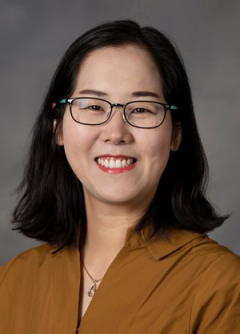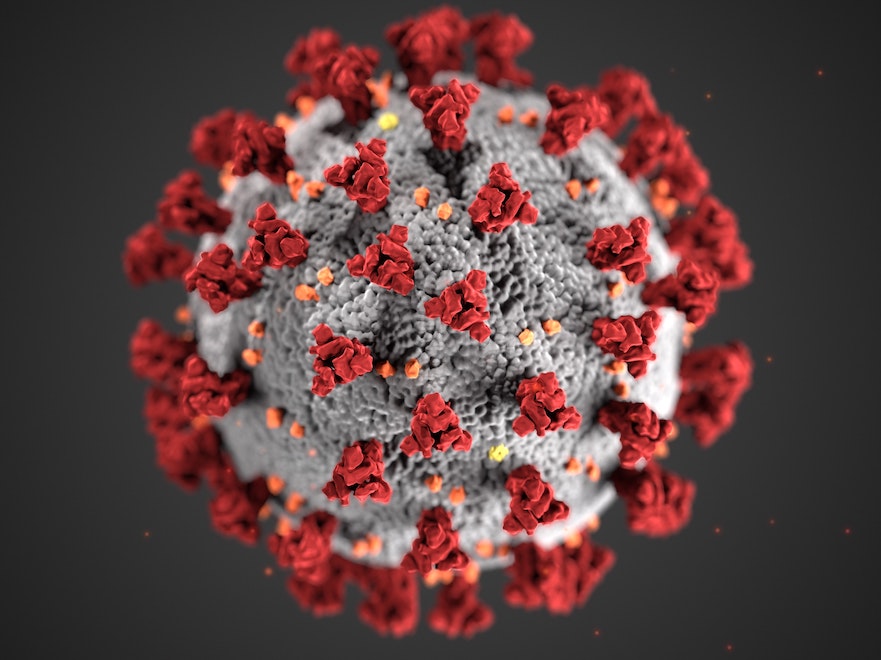The three-year grant secured by Assistant Professor of Mathematics Hwayeon Ryu will support the development of a mathematical model that could guide the development of new treatment options for the SARS-CoV-2, commonly known as COVID-19, virus.
The National Science Foundation has awarded Assistant Professor of Mathematics Hwayeon Ryu a three-year, $300,000 research grant to support her work with collaborators to develop a mathematical model that could facilitate new COVID-19 treatment options in the future.

As principal investigator, Ryu will be leading the research team as it develops a model for how the human immune system responds to COVID-19, with a particular focus on the timing of the immune response and its impact on the severity of the disease. The grant will allow three Elon student researchers to join the effort each year, with work throughout the academic year and during the following summer.
“I think a lot of the efforts have been made to stop the spread of the virus, and now the focus has changed,” Ryu said. “It’s really a good time to think about how we can fundamentally deal with this virus. Ultimately, we are going to develop a longstanding treatment. I see this type of research project as a starting point to motivate not only other researchers, but also biologists and clinicians who can test some of the hypotheses coming out of our research.”
Ryu said that while much more is understood about how COVID-19 can spread within the population, there is still much work to be done to understand how our bodies respond once infected by the virus. There is very little clinical data to help shine light on that response, which makes the development of a mathematical model a particularly appealing approach to understanding the immune response and developing therapies for those infected by COVID-19.
The complex mathematical model will include 17 components, six of which are cytokines, which are small proteins secreted by cells that can regulate the body’s immune response. The model’s accuracy in predicting the body’s response will be validated against the existing but limited experimental or clinical data.
“Given our current knowledge with such limited information, we hope to develop a mathematical model that is keeping track of each component to understand how they are interacting with each other and how we can identify the key pathways that can be therapeutically investigated further,” Ryu said.
Of particular interest in the development of the model is to be able to replicate the emergence within the immune response of a “cytokine storm.” During such an event, the body’s immune system has an excessive and uncontrolled release of cytokines, which promote inflammation. This overproduction of cytokines can be particularly dangerous and harmful in elder, immunocompromised people, Ryu said.
“That’s one of the side effects that the clinical data is showing, but there’s not enough information or knowledge of how to resolve the issue,” Ryu said.
That’s where the mathematical model comes in. The model can allow researchers to change parameters, such as when certain therapies are introduced, to better understand how the body will react. It’s a level of experimentation that’s not possible in the clinical setting. “If you give a bunch of therapies at the beginning of the symptoms, is the body going to be confused?” Ryu said. “Using a mathematical modeling approach, we can actually test out of a lot of different scenarios. We can even suggest how existing therapies can be modified to improve their efficacy.”
Collaboration and undergraduate research
Ryu will mentor Elon students and collaborate with her interdisciplinary team of experts from three universities to conduct this research study. Her expertise is mathematical modeling and analysis of dynamical systems arising from systems biology, neuroscience, and immunology.
Collaborators include Kamila Larripa, an assistant professor of mathematics at Humboldt State University who has expertise in disease and immune dynamics, Susanna Röblitz, a professor of informatics at the University of Bergen in Norway who will guide the team in simulating high dimensional dynamical systems, and Laura Newcomb, a molecular virologist as well as professor of biology at California State University, San Bernardino.
“Our goal is to broaden access to undergraduate research across Elon’s campus,” Ryu said.
Given the interdisciplinary nature of the project, Ryu and her team are seeking to recruit students from diverse groups and different backgrounds. These undergraduate researchers will be involved in all aspects of the grant work, from the development of the model, to addressing treatment-related questions via numerical simulations. All students involved will also have opportunities to present their work at regional or national conferences, and to perform service that brings math to the larger community, such as helping organize Integrating Research in Science, one-day regional conference targeted for undergraduates in all STEM fields in collaboration with a team from Wake Forest University.
The grant provides access to a more diverse pool of undergraduate mentees in mathematics and broader STEM disciplines. That access includes paid research opportunities as well as travel support, and includes necessary training that would not be available otherwise.
—
Acknowledgement: Research reported in this press release was supported by the National Science Foundation under Award Number DMS-2151990. The content is solely the responsibility of the authors and does not necessarily represent the official views of the National Science Foundation.



